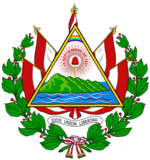User:Guadajara/Politics
Politics of Guadajara | |
|---|---|
 Coat of arms | |
| Polity type | Federal presidential constitutional republic |
| Constitution | Constitution of Guadajara |
| Legislative branch | |
| Name | National Assembly |
| Type | Bicameral |
| Meeting place | Palacio de Garteiz |
| Presiding officer | Maritza Narvaez,, Speaker of the National Assembly |
| Upper house | |
| Name | Senate |
| Lower house | |
| Name | Chamber of Deputies |
| Executive branch | |
| Head of State and Government | |
| Title | President |
| Currently | Noé Elías Melendez |
| Appointer | Direct popular vote |
| Cabinet | |
| Name | Cabinet of Guadajara |
| Current cabinet | Melendez |
| Leader | President |
| Deputy leader | Vice President |
| Ministries | 17 |
| Judicial branch | |
| Name | Judiciary |
| Supreme Court | |
| Chief judge | David Illescas |
The politics of Guadajara functions within the framework of a federal Presidential republic under a Constitution.
Executive power is exercised by the President of Guadajara and the Cabinet. The Cabinet consists of the Prime Minister, 16 ministers and secretaries of state; the Prime Minister is appointed with recommendations of the National Assembly. The Cabinet, including the Prime Minister, can be dismissed by the National Assembly through a vote of no confidence.
Executive branch
President
Vice President
Legislative branch
The National Assembly of Guadajara exercises federal legislative power in the country and is responsible for drafting and enacting federal laws. It is bicameral, divided into the Senate (?? seats) and the Chamber of Deputies (??? seats), both presided over by the Speaker of the National Assembly.
The National Assembly meets annually at Palacio de Garteiz in Guadajara City, between March 1 and November 31, although the President may call extraordinary sessions or extend them. In the former case, the President determines the issues to be discussed, while in the latter case the National Assembly has free initiative. The National Assembly itself may also order the extension of sessions.
The Chamber of Deputies is comprised of a number of representatives, varying according to the provincial populations, but not less than three, elected on the basis of the principle of proportional representation (D'Hondt system), with a term of office of six years, with half of the representatives being re-elected every three years, and with the right to be re-elected for an unlimited period. They are elected taking as a single district each province, where a list of all the candidates of each political party or electoral union for the seats that each district contests in that election. The Gender Equality Act stipulates that half of elected candidates for the National Assembly must be women. This law has encouraged women's participation in politics, making Guadajara one of the countries with the highest number of women in the legislature and one of the twenty-five highest in the world.
The Senate is populated with two senators chosen by each province; one for the majority and one for the minority. These are elected by direct vote of the inhabitants of each district, by means of an incomplete list system, with two senators corresponding to the list that obtains the highest number of votes and one to the next one. Their term of office lasts six years and is renewed by thirds every two years, with the renewal elections to be held in alternating districts, and they may be reelected indefinitely.
The Senate is formed by two elected senators from each province, one from the majority and one from the minority. They are elected by direct universal suffrage in each constituency on the basis of a partial list system, with two senators representing the list with the highest number of votes and one representing the other list. Their term of office is six years, renewable indefinitely thereafter.